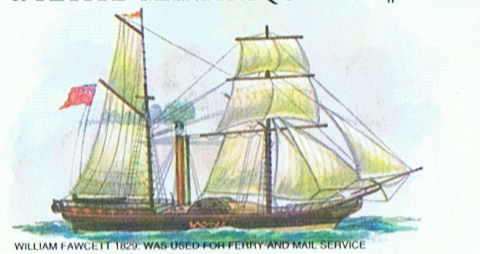
Wooden paddle steamer William Fawcett, built 1828, Caleb & James Smith, Liverpool.
206 grt, 186 nrt, 146 x 22 x 15 ft, engines 140hp by Fawcett & Preston, Liverpool
First owner: Wm. Fawcett & Joseph R. Pim, Dublin, registered Dublin
From 1831 Dublin & London Steam Packet Co.
6th April 1834, caught fire after discharging her cargo, while alongside at
Sir John Rogerson's Quay, North Wall, at Dublin; sunk.
Captain Campbell and crew all saved. Vessel repaired.
In 1835 used for voyages to the Iberian Peninsular - effectively
the first P & O vessel.
More history.
Image
of William Fawcett.
Yet
more history.
Image of William Fawcett from a postage stamp:

Liverpool Albion - Monday 10 March 1828:
LAUNCH. -- At twelve o'clock on Wednesday the extensive premises of
Messrs. Caleb and James Smith, Baffin-street, Queen's Dock, were
visited by considerable numbers, to view the launch of a new steamer,
of 400 tons burthen. At the appointed hour the usual ceremony of
christening was performed, and, success having been wished to the
William Fawcett, all obstructions were removed, and the noble vessel
glided rapidly, though majestically, into the element over which she
was seen triumphantly to move, in a few seconds, amid the most
enthusiastic cheers. She is built upon the most improved principles,
and will be propelled by engines of 130 horses' power, manufactured
by Messrs. Fawcett and Preston. She has received her name in honour
of the head of the firm, a gentleman whose scientific talents and
public spirit have considerably tended to the advancement of steam
navigation.
From Monmouthshire Merlin Saturday 19 April 1834
FIRE ON BOARD A DUBLIN STEAMER. We regret to announce a
serious loss of property occasioned by the partial destruction by fire
of the William Fawcett. A little after five on Sunday evening the crew
of the William Fawcett, which only arrived the previous morning from
London, were alarmed by seeing smoke issuing from the cabin, and also
from the adjoining place, where coals for the use of the engine are
kept. On examining closely, it was found that the fire was spreading
in the rooms under the quarter-deck, and messengers were at once
despatched for the fire-engines. The vessel was scuttled in several
parts adjoining the stern, but from the lowness of the tide, the water
did not reach to many feet. It was a considerable time before more
than one engine arrived, and then the fire had attained a fearful
height, rolling in large masses out of the windows, and curling round
the seats - on deck and the wheel. The planks soon gave way, and all
the stern became one fiery mass, while the flames ran up the cordage,
and coiled around the mast adjoining the large chimney. A number of
engines reached some time after the first one had commenced playing,
and a sufficient supply of water was obtained from the river; buckets
were also handed about by a chain of men stationed on the vessel, and
broad planks having been laid from the side, the Globe engine was
brought on board to play more effectually. The sailors commenced
removing the luggage and bedding; the sails were carried away, and all
the stairs and timber work which could be removed were thrown into the
water, and then taken in tow by men who were stationed with boats
round the vessel. The mast nearest to the stern having at last taken
fire, to prevent danger from its falling upon the people on shore, it
was flung into the water by means of ropes twisted around the upper
part. At this period the scene presented a sublime and varied
appearance. The wind blew directly from the stern to the forecastle of
the steamer, and, had it been more violent, the loss of property would
have been much greater. About eight the flames began to subside, owing
to the unceasing exertions of the fire engines, and at nine nothing
remained but a dense smoke; on the blackened mass which the
quarter-deck now presented, large streams of water were discharged,
and this was continued up to a late hour. During the confusion, when
the conflagration was raging most intensely, the funnel or chimney
having lost its support, fell upon the deck with a fearful crash,
striking down one man, who was removed, we believe, to the hospital,
having been dangerously hurt by the blow. Nothing has yet been
ascertained as to the origin or the fire. The captain (Mr. Campbell)
was on board, seated at dinner at the time; he has lost the property
deposited in his trunks, and had not time to save a single article
from the flames. The damage done to the vessel is estimated by very
competent persons £5000. It is insured. All the goods which she
had brought from London were fortunately discharged from her on
Saturday. Messrs. Bournes were the principal proprietors of the
William Fawcett. - Dublin Evening Mail